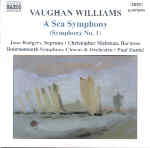This performance could have been a serious contender despite very strong competition, but it’s sabotaged by incompetently engineered sound that makes normal listening a chore. Paul Daniel leads a vivacious account of the score, with big contrasts between fast and slow tempos (particularly in the outer movements), and he gives this sprawling work the immediacy and sense of expectancy it needs. There’s always a feeling that the next big climax is just around the corner, and Daniel clearly relishes the music’s sense of spectacle while never stinting the more reflective moments. He also secures fine playing from the Bournemouth Symphony Orchestra, and the chorus acquits itself admirably with excellent diction and plenty of enthusiasm. That’s the good news.
The opening brass fanfare promises much, and the first big crash from cymbals and bass drum offers satisfying solidity. But already as the violins rise in broad waves, their upward progress almost inaudible until they reach the top of the phrase, there are oddities of balance that prove disturbing (listen also to the harps as they come and go in the mix). While the opening choral apostrophe to the sea goes well enough, baritone Christopher Maltman’s entry is disastrous. He’s placed so far forward and so close to the microphones that he might as well be standing in your listening room shouting in your ear. From here on the performance seems to take place in at least two different acoustics depending on who is singing, with little coherent sense of ensemble or soundstage at all. The need to reduce the volume whenever the soloists have the floor robs the ensuing climaxes of their necessary body and impact, and the result is simply a sonic mess.
In any case, Maltman is not the most appealing of singers to take on this part, and neither is soprano Joan Rodgers, who sounds positively tremulous. But frankly no voices were made to suffer this kind of close-up scrutiny. What is the point of Daniel’s evocative mood-setting in “On the Beach at Night, alone” when it’s shattered by Maltman’s way too prominent entrance? This isn’t his fault; clearly he’s singing quietly, but still his (somewhat wobbly) voice issues forth boldly from the speakers. Given a little breathing room, I have no doubt that both singers would have made a far better impression, but they have a lot of work to do and you can basically write off any passage in which they appear. In the final analysis there are simply too many fine performances of this piece, most of them also superior sonically, to give this newcomer anything more than a very qualified recommendation. Hopefully Naxos won’t let producer/engineer Tim Handley anywhere near future productions involving solo voices and orchestra. A disappointment.
































